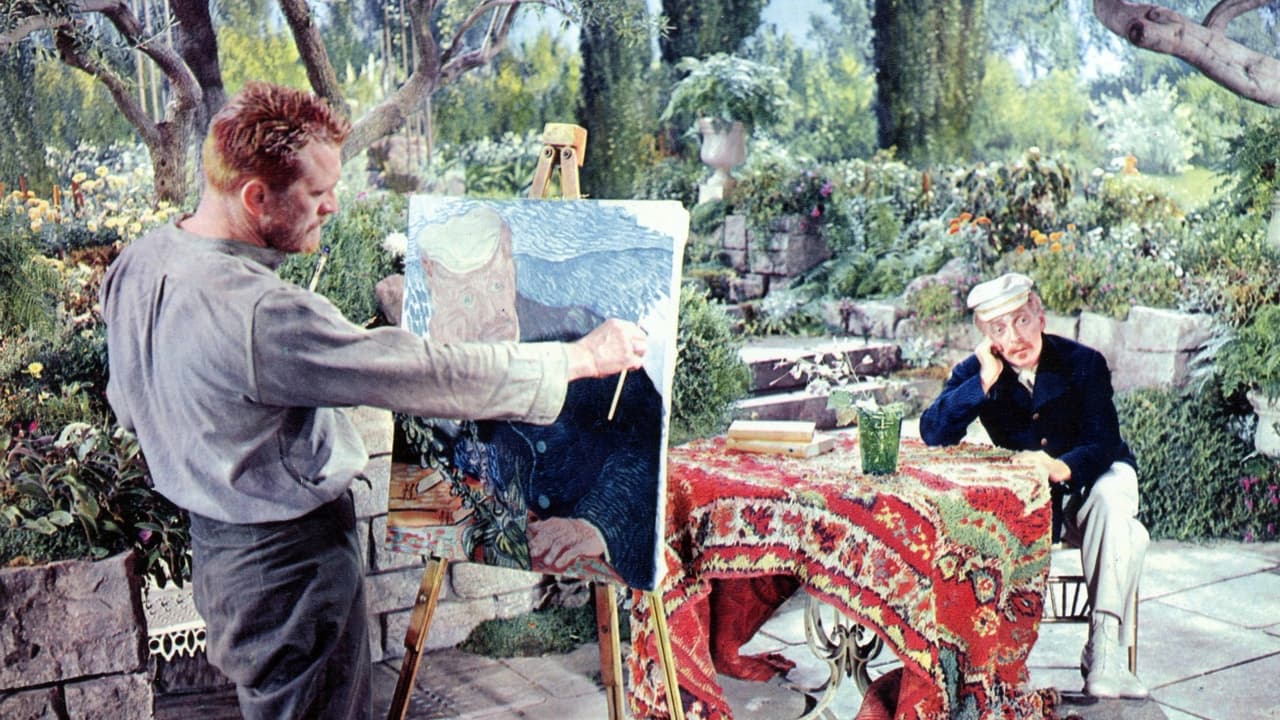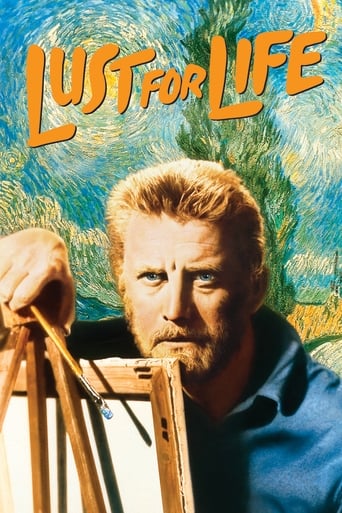

Vincent Van Gogh was Kirk Douglas's finest role, and I believe no other actor could have bettered Douglas's performance. I have always wondered how much Kirk identified with Van Gogh, and his state of mind.
... View MoreKirk Douglas becomes Vincent Gogh and is terrific in this film. Just watch it for the portrayal.Vincent Gogh lived a very complicated film, as shown in the film perhaps. But to adapt to the complications and portray them without any compromise would have been the most challenging part. Kirk Douglas, the fine actor he is has done this effortlessly. Kudos to the great man for his acting itself.Expectedly, the art direction is wonderful, as this is a film about painter, his paintings in itself would make the shots beautiful. The cinematography was adequate if not great. The lines were good and the editing was fine. But mind you, this is a biopic so it would take some liberties in terms of length in showing few important aspects of the life of Vincent Gogh.Vincent Minnelli was one of the most celebrated directors of his time and he did this film with a great grand vision as his earlier films. But, he somewhere lost his vision in the making. He made a clichéd biopic that is definitely good but must not great. I suppose that the script did little justice to the emotions which Kirk Douglas portrayed and also what Vincent Gogh could have gone through emotionally. This is good for a one time watch just for acting. A 3/5 for a good film and of these, 2 stars only to Kirk Douglas and the remaining star for the film overall. It's a good film but tests our patience at times.
... View MoreVery engrossing a really made with millions of sweat ,toil and hard work ,I watched lived and gone into trance beautifully crafted,I take hats off for great director crew and cameraman ,I want keep this in my film library.How they created the scenes on actual grounds where the two greatest artiste lived ,the paintings and then taking viewers to actual scenes is something unusual,the chat with lady who saw this painter in her childhood who as i know died recently,something unbelievable,Great work.Hopefully all art lovers will keep this in their film library ,a commendable work ,a Oscar to be given every year to it.
... View MoreThis seems burdened with the trappings of the usual 1950s biographical picture. The usual formula goes something like this. An epic musical score accompanies the tale of a man who discovers a hidden talent in himself, rises to the top, is undone by internal demons, then rediscovers his authentic self and finds peace and love.But you won't find that stereotypical structure here. Kirk Douglas is Vincent Van Gogh, the Dutch painter who led a tumultuous, immensely productive, and finally tragic life, relieved only by a few intermittent episodes of happiness and clarity.I don't think I'll bother dealing with my impression of the quality of his work, because I am an ignoramus and because I've already reviewed it in Simon Schama's "The Power of Art: Van Gogh." It's enough to say that Vincent Minelli's film doesn't spare Van Gogh. His early sketches are pretty clumsy. I did better than that in high school.But the poor guy's life was a shambles. He failed as a minister and later as an artist. His brother Theo managed to sell only one of his paintings during his lifetime. Van Gogh fell in love but his approach was so clumsy, so inept, that the woman finally refused to speak to him. Then he fell in with a whore, who left him because -- genius or no -- he was not making enough money to suit her.But the greatest of Van Gogh's loves that we see in the movie, aside from painting itself, is Anthony Quinn's Paul Gaugin, who was something of a jealous fraud. In Tahiti Gaugin copied some of his paintings from photographs. And when I lived in Polynesia I found out that Gaugin's "Vahini No Te Vi" wasn't carrying a "vi" at all.Not that it matters except that it illustrates the difference in attitudes between Gaugin and the man who hoped most desperately to be his best friend. Gaugin's painting were flat in tone and careless about their sources while Van Gogh's strove for authenticity and impact in their frightening imagery -- those roiling skies, those agonized cypress trees. One of their more demonstrative arguments led to Van Gogh's famous self mutilation. It's a shame because Province was an ideal place for Van Gogh to work. He loved it. The sanitized collection of Van Gogh's letters are ecstatic about the light and warmth of Arles. The letters in fact are as full of color as his paintings. That yellow house he lived in still stands. It's been converted into a tourist attraction with an al fresco café.The screenplay is unsparing. Van Gogh's life was disorderly and filthy, his face and hands paint stained. And Kirk Douglas embodies the artist. It may be one of his best performances. He gives the painter a habit of rubbing his stained fingers and palms over a face and skull devoid of any glamor whatever. His brother Theo is played by James Donald, always a sympatico figure on screen. The enthusiastic but helpless Dr. Gachet is played by Everett Sloane. Anthony Quinn as the tempestuous Gaugin is thoroughly convincing. There's a nice touch when he visits Van Gogh for the first time in Arles, looks at the mountain of magnificent paintings, and slumps because they're better than his own work. "Well, I see you've been busy," he manages to say.This is far superior to the usual biography. The style is classic. The camera doesn't do tricks. It's not "Lawrence of Arabia." But, like Lawrence, it's about an unstable man of extraordinary talent. Today, Van Gogh would probably be diagnosed as bipolar. Everything points to it. And instead of quietly resting in a sanatorium he'd be treated with drugs. He might have painted fewer pictures but he probably wouldn't have shot himself in the stomach and died early.The viewer will get to see in close up many of Van Gogh's more familiar pieces. Those less familiar with our cultural history will benefit at least as much as those of us who are older and know a little something about the man. What I mean is that everybody, regardless of background, can afford to take another gander at "Starry Night" if only to be reminded of the thin line between self torture and the apprehension of a rapturous beauty.
... View More